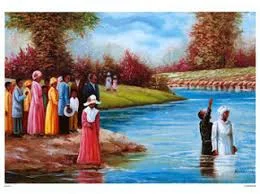Our scripture lessons for Trinity Sunday – particularly the epistle and the gospel - are noticeably short. Why is it, then, that some of the longest sermons I have ever endured – including my own – were preached on Trinity Sunday? In dealing with the great mystery that is the Holy Trinity, the lectionary committee wisely decided to keep it short. After all, there is no amount of scripture that can effectively explain the mystery of the Trinity. But rather than taking a cue from the lectionary committee (and holy scripture), preachers oftentimes fall into the trap of using the pulpit to try to explain what our scriptures allow to remain as a holy mystery.
Most simply stated, God uses multiple means for loving and relating to us. The Triune nature of God - traditionally known as Father, Son, and Holy Spirit – reminds us that God manifests God’s very own self within a diverse community. Michaela Bruzzese points out that in the Holy Trinity, God is not limited to one expression of love or relationship, or one dimension of caring. God relates to us as the Holy Parent/Creator, the Beloved Son/Child, and the ever-present Spirit. And these means of relating to us are not meant to be abstract and intellectual. They are God’s tangible, concrete means for loving God’s very own creatures and creation.
So I think that a great way for us to consider the great mystery of the Holy Trinity is to do so in the same manner that God expresses God’s very own self – through a diversity of expressions.
In our worship service today, we are expressing our understanding of and gratitude for the Holy Trinity through the words of our liturgical prayers, most explicitly in the Collect of the Day and the Nicene Creed. During the 10:30 service, the hymns are taken from the Holy Trinity section of the Hymnal, and explicitly have trinitarian themes and language. For some of us, music is the medium through which God most effectively reveals God’s self to us. So some of us are more likely to experience God through the singing of a hymn than we are reciting an ancient creed.
Another way that many of us experience God is through visual art. During the Seasons of Advent, Christmas, and Epiphany, our Wednesday Noonday Prayer group studied icons from the Eastern Orthodox Christian tradition. Icons are “a window out of the obvious realities of everyday life into the realm of God.” Our bulletin cover this morning includes an image of Andrei Rublev’s famous icon for the Holy Trinity. After worship today, I encourage you to take your bulletin home with you and read the material at the end that describes this icon in great detail. For some of us, gazing at this icon or other ones similar to it are more likely to reveal the reality of God more than an erudite sermon or beautiful hymn.
After the sermon this morning, we will experience another medium through which God reveals God’s self - bodily movement and dance. As Buffy mentions in her description in the bulletin, what you will observe is not meant to be seen as a performance but rather, a kind of visual prayer. In Buffy’s own words, this movement is “an invitation to enter into contemplation of this divine gift, communally, with thanksgiving.”
After this meditation that involves contemplative bodily movement, we will stand and engage our intellect and collective voices as we recite the Nicene Creed. Many Christians these days argue that the Apostles’ and Nicene Creeds no longer bear relevance, and should be relegated to the historical documents of the church, but not our common worship. I deeply value contemporary scholarship, and I firmly believe that the Holy Spirit didn’t cease all inspiration after the Council of Nicaea in the 4th century. That being said, I also deeply value the inspired wisdom of the Early Church, and I believe that our continued communal engagement of their voices honors the diversity of God’s witness through the ages. The Creeds aren’t the only way through which the Holy Trinity is revealed to God’s people, but they are one of the many faithful, reliable means through which God’s reveals God’s diverse self.
But the diversity of the Holy Trinity isn’t only revealed through the church’s scripture, music, liturgy, and worship. God reveals God’s very own self to us through a myriad of mediums and means. Most recently, I experienced the diversity of God’s power, love, and presence through Vacation Bible School this past week at Christ the King. Our church property was abounding with energy from people ranging in age from 4 to nearly 80! Children were experiencing the mystery and love of God through songs, stories, and most notably, play. I truly believe that we have a playful God, and one of the best ways to connect with God is through play, regardless of our age. It brought me great joy to see the likes of Tommy Fairweather, Tom Huff, Geoffrey Butler, and Jane Hinte playing with children several decades their younger at VBS. My guess is that the children and the adults all experienced God in new and exciting ways during that week of intentional, joyful play. Yes, I believe that God is revealed in the ancient creeds of the Church as well as in an inflatable bouncy house!
As Jesus said to his disciples as recorded in our Gospel lesson for today, “When the Spirit of truth comes, he will guide you into all the truth.” So our role as followers of Christ is to allow ourselves to be guided by the Holy Spirit. If we humble ourselves enough to be open to the many means, mediums, and people through which and through whom God the Spirit communicates, we are more apt to experience what the Apostle Paul describes as “God's love… [which has been] poured into our hearts through the Holy Spirit.”










